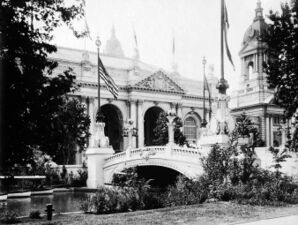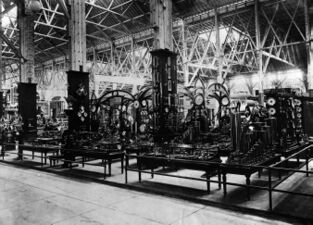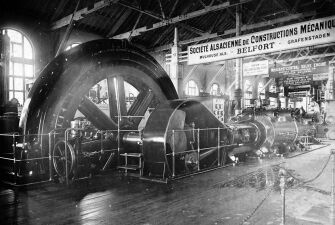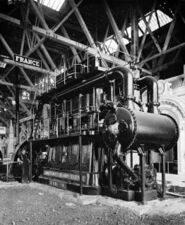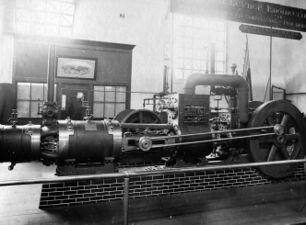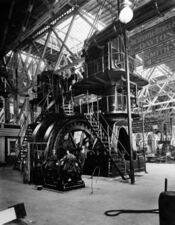Palace of Machinery: Difference between revisions
No edit summary |
No edit summary |
||
| (One intermediate revision by the same user not shown) | |||
| Line 3: | Line 3: | ||
| name = Palace of Machinery | | name = Palace of Machinery | ||
| image = Palace of Machinery.jpg | | image = Palace of Machinery.jpg | ||
| image_alt = | | image_alt = | ||
| image_size = 400px | | image_size = 400px | ||
| caption = Palace of Machinery | | caption = Palace of Machinery | ||
| Line 24: | Line 24: | ||
| ticket_image = | | ticket_image = | ||
}} | }} | ||
The Palace of Machinery's message was power. Fairgoers were astounded by the colossal engines on display as well as latest in woodworking, steel, construction, and electronic equipment. The 180,000 square foot Palace of Machinery stood south of the [[Palace of Transportation]]. It used it's powerful generators to produce electricity and lights as well as run the massive pumps that fed water to the Cascades. | The Palace of Machinery's message was power. Fairgoers were astounded by the colossal engines on display as well as latest in woodworking, steel, construction, and electronic equipment. The 180,000 square foot Palace of Machinery stood south of the [[Palace of Transportation]]. It used it's powerful generators to produce electricity and lights as well as run the massive pumps that fed water to the Cascades. | ||
Latest revision as of 08:03, 1 March 2024
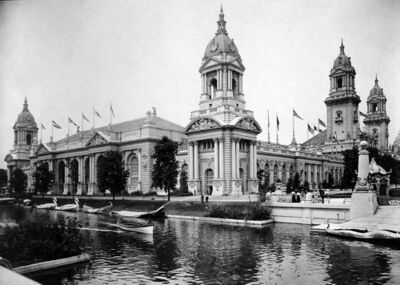 | |
| Location | Main Picture |
|---|---|
| No. of Buildings | 1 |
| Construction | |
| Construction Cost | $646,533 ($19.5 million in 2021) |
| Architecture | |
| Architect | Windman, Walsh & Boisselier of St. Louis |
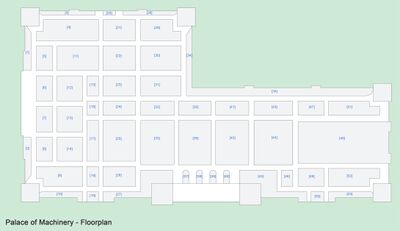 | |
The Palace of Machinery's message was power. Fairgoers were astounded by the colossal engines on display as well as latest in woodworking, steel, construction, and electronic equipment. The 180,000 square foot Palace of Machinery stood south of the Palace of Transportation. It used it's powerful generators to produce electricity and lights as well as run the massive pumps that fed water to the Cascades.
Description[edit | edit source]
The mighty palace featured German-influenced towers, entrances and even the roofs. The two north-side towers were each two hundred and eighty feet high. Sixty foot high archway brought awed fairgoers into its Northern entrance. The 12 acre-sized fireproof building was richly fabricated with ornate staff and sculptural decoration.
Generators totaling 45,000 rated horse-power pumped life into the many exhibits, lights and water features in the fairgrounds. The Allis-Chalmers vertical and horizontal refrigerating engine was the largest equipment in the palace, generating five thousand horse-power.
The General Electric Company's Curtis Steam Turbine, could produce 8,000 (and higher given adequate steam supply) and with the other generators provided hundreds of kilowatts of alternating current for the Fair's lighting system. Westinghouse also provided a smaller generator in its display.
An annex building to the palaces west named 'The Boiler House', contained all the furnaces to generate all the power for the Fair, using 500 tons of coal each day. Steam created from the Boiler House was piped into all the Palaces.
Two thirds of the palace was devoted to the means of making machinery. Fairgoers could view German Krupps Works exhibition of metal embossing using hydraulic pressure and the latest metal and woodworking machinery. the Famous Oil Filter and Purifying Plant filtered all the oil used in the palace in order for it to be reused. There were the latest lathes and woodworking equipment, machines to crush distribute coal, superheater, tools creation, fire and feed water pumps and the most modern of steam and gas production. Displays varied from J.H. Williams dropped chains exhibit to Gould's Power Pump displays to forged tools to Macaroni machines.
Brown Corliss Engines from Corliss Wisconsin, provided power to the Fair's railways.
Large cranes were stationed in the palace to move the various machinery.
The German Company A. Borsig, showcased a 1,750 horsepower engine that used only 1,550 pounds of coal an hour. That's 30% less fuel than American machines used for the same horsepower.
Outside of the palace, patrons marveled at the massive water pumps that powered the Cascades. These huge machines could move 165 million gallons of water each day (two and a half times more than the entire city of St. Louis).
The worth of all the exhibits in the palace of machinery totaled more than eight million dollars (equivalent to $241,274,074 in 2021).
Gallery[edit | edit source]
-
Front view of the Palace of Machinery
-
Sectional View of Building
-
1,000hp Steam Dynamo
-
French Exhibit
-
Layner Air Compressor
-
Stilwell-Bierce
-
Taylor Iron & Steel
